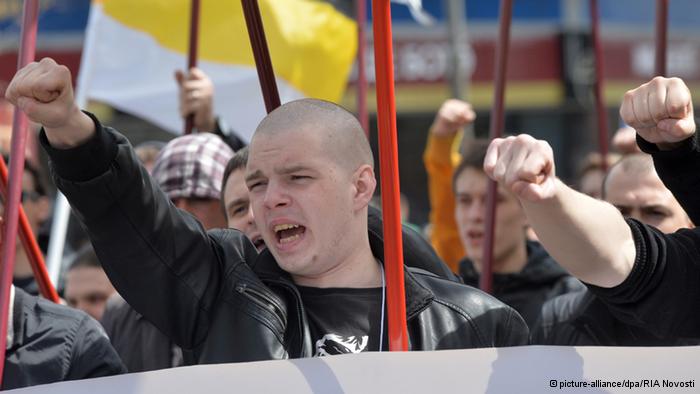
Crimean Events Bolster Russian Neo-Nazis
Publication: Eurasia Daily Monitor Volume: 11 Issue: 64
By:

The eyes of the world—especially those of analysts in the West—have been trained on the ongoing situation in Ukraine, but the situation inside Russia also shows signs of being affected by Crimea’s annexation. In particular, President Vladimir Putin’s defense of ethno-nationalism has invigorated Russia’s homegrown extremist movement.
In particular, two Russian “white wagon” attacks took place in March. This assault tactic consists of extremists boarding a train and beating everyone who is not white in that carriage. On March 1, between 30 and 40 people boarded a Moscow suburban train at the Opahlika station and began looking for people of “non-Slavic appearance.” They beat up two Central Asians before departing to attack some Japanese tourists on the platform at Pavishino, some two stops past Opahlika (https://www.sova-center.ru/racism-xenophobia/news/racism-nationalism/2014/03/d29075/). On March 9, another “white wagon” assault was carried out by nationalists on a Moscow region train. According to the report, five young men boarded at the Khmiki station in Moscow carrying an Imperial Russian flag (black-white-gold) and shouting “Churka [a racist epithet for a person from the Caucasus or Central Asia] Out!” They beat two migrants, including a Tajik who tried to hide (https://www.sova-center.ru/racism-xenophobia/news/racism-nationalism/2014/03/d29110/). While there is sadly nothing particularly unusual about incidents of racist violence in Russia, the “white wagon” technique has, until now, been infrequently used due to the greater risks of arrest that are involved.
Meanwhile, the provocative open display of the Russian imperial flag has also coincided with growing nationalist pride in the country after Russia’s invasion of Crimean. Russia’s revanchist actions in Ukraine are only invigorating those of a nationalist persuasion. On New Pushkin square in Moscow, on March 15 (the same day as that a “March of Peace” was held to protest a possible war with Ukraine), a group of Russian Orthodox standard-bearers held a counter-demonstration in support of the Kremlin. They were joined by activists from the ruling United Russia party as well as the far-right Liberal Democratic Party of Russia (LDPR). Other nationalist rallies took place on March 9, March 19, March 18–19 and March 21 in St. Petersburg as well as Moscow (https://inpress.ua/ru/politics/27578-poka-kreml-pugaet-mir-banderovtsami-v-rossii-pravoradikaly-ubivayut-nerusskikh-i-ustraivayut-belye-vagony-video).
As the Kremlin has continued to use the argument of protecting Russian speakers abroad to legitimate Moscow’s aggressive and expansionist foreign actions, domestically the idea of a renewed Russian empire may be rooting itself in ethnic conceptions of Russian-ness. This trend is already appearing in the “Guestbusters” campaign championed by, among others, Dmitry Demushkin, leader of the extremist organization Slavic Union.
“Guestbusters,” a campaign against foreigners living and working in Russia, describes itself euphemistically as “a project for people who live daily with lawful citizens and are faced daily with problems of contemporary cities.” The main page of “Guestbusters”—whose name and logo is a play on the 1984 film “Ghostbusters”—continues by claiming that “every seventh person living in Russia today is an immigrant” (https://www.migrantam.net/). The “Guestbusters” campaign predates the Russian invasion of Crimea, but its followers have enthusiastically welcomed the Russian state “defending” ethnic Russians living abroad. And in the wake of the Crimean crisis, the “Guestbusters” have been organizing marches in support (https://vk.com/guestbusters). And as Russia’s isolation from the Western world has increased, the “Guestbusters” project has simultaneously boosted its activity.
Nationalists have not limited their attacks to just the major cities or migrants, however. On March 23, in Irkutsk, for example, around 30 youths attacked a teacher at an English-language school outside the “fashionable” mall in the center of the city (https://www.irk.ru/news/20140324/fight/). The timing of this violence against a symbol of the West in Russia coincides with rumors about Western sanctions being imposed on Russia and may indicate that extremist Russian nationalists are acting on the Kremlin’s anti-Western propaganda—what the journalist Vladimir Milov described as the “anti-Western mythology” of the Kremlin. According to Milov, the mythology, which is extremely harmful for Russia, is built on a number of outright falsehoods: first, that the West offended Russia following the Cold War, but that now revisionist Russia is a just regime; second, that the West sought the downfall of Yugoslavia in the 1990s and now seeks the same for Russia; third, that the enlargement of the North Atlantic Treaty Organization (NATO) threatens Russia; fourth, that the West has attacked Iraq, then Libya, and will be coming for Russia next; and fifth, that the West has financed the “color revolutions” across the post-Soviet space through non-governmental organizations (https://www.echo.msk.ru/blog/milov/1286428-echo/). Milov’s analysis of the anti-Western mythology reveals a picture of the West that expresses Russia’s paranoia and certainly could rationalize even more violence of the kind seen in Irkutsk. Such violence comes after Russia has turned itself, in the words of journalist Masha Gessen, into the leader of the anti-Western world (https://www.ua-ru.info/news/9322-rossiya-transformiruetsya-v-lidera-antizapadnogo-mira.html).
Already one of Russia’s strongest “social” movements, far-right nationalists may limit the government’s room for diplomatic maneuver around protecting ethnic Russians in other countries, if nationalistic propaganda succeeds in polarizing Russian public opinion further. Moreover, the tension between state and society augurs ill for the future as the extremism of one group or the other shifts the political “center” further to the right. Indeed, there are already signs that Cossack movements in Tatarstan view the naked defense of ethnic Russians as tacit consent to begin their own agitations in that republic (see EDM, April 3). If pushed too far, the indigenous minorities in Russia will react.




